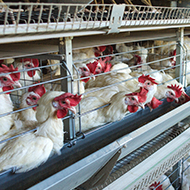
Compassion in World Farming raises concern over heatwave.
Animal welfare campaign group Compassion in World Farming is calling on Defra to suspend journeys for farmed animals in extreme heat, unless absolutely necessary.
Temperatures are expected to reach 35 degrees celsius in areas of the UK throughout the week, and Compassion is concerned that farmed animals will suffer and die in the heat if precautions are not taken.
Research manager at Compassion in World Farming, Phil Brook, explained: “In the extreme weather conditions expected, it’s vital that Defra suspends any long journeys for farmed animals to avoid undue suffering from heat exhaustion.
“The heat inside the trucks can be unbearable with animals desperately panting for air. Long journeys should be suspended and short journeys should only take place if absolutely necessary and at night when it’s cooler. Sufficient water must also always be within reach to avoid dehydration.
“It is simply not possible to ventilate lorries so that temperatures remain at a reasonable level in temperatures over 30 degrees. That’s why we’re calling on Defra to suspend long journeys and to issue advice to farmers to improve ventilation and reduce stocking densities in what are often already overcrowded indoor factory farms.
“Animals reared outdoors must have access to shade and fresh water at all times.”
The animal welfare organisation and lobby group also highlighted the livestock industry's role in climate change.
Phil continued: “It also cannot be ignored that the livestock sector is responsible for 14.5% of global greenhouse gases – more than all direct emissions from the transport sector.
“Meat producers and suppliers must therefore implement more sustainable systems, retailers must demand higher welfare standards and consumers must engage and acknowledge how their food choices impact on our environment.
“Ultimately, we all need to ask ourselves: are we really willing to risk frying the planet to satisfy our appetite for cheap meat?”



 The Veterinary Medicines Directorate (VMD) is inviting applications from veterinary students to attend a one-week extramural studies (EMS) placement in July 2026.
The Veterinary Medicines Directorate (VMD) is inviting applications from veterinary students to attend a one-week extramural studies (EMS) placement in July 2026.